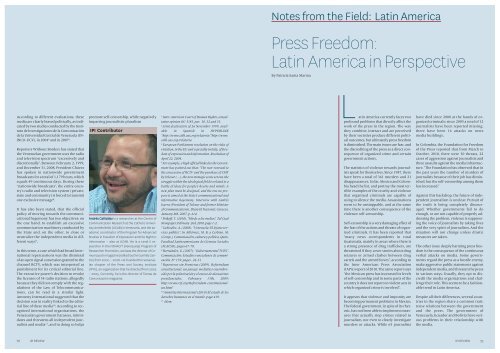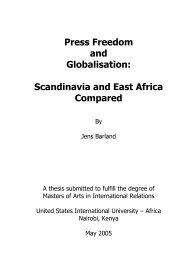FOCUS ON THE AMERICAS - International Press Institute
FOCUS ON THE AMERICAS - International Press Institute
FOCUS ON THE AMERICAS - International Press Institute
Create successful ePaper yourself
Turn your PDF publications into a flip-book with our unique Google optimized e-Paper software.
According to different evaluations, these<br />
media are clearly biased politically, as indicated<br />
by two studies conducted by the Instituto<br />
de Investigaciones de la Comunicación<br />
de la Universidad Central de Venezuela (IN-<br />
INCO-UCV), in 2004 6 and in 2007 6 .<br />
Reporters Without Borders has stated that<br />
the Venezuelan government uses the radio<br />
and television spectrum “excessively and<br />
discretionally”. Between February 2, 1999,<br />
and December 31, 2008, President Chávez<br />
has spoken in nationwide government<br />
broadcasts for a total of 1,179 hours, which<br />
equals 49 continuous days. During these<br />
“nationwide broadcasts”, the entire country’s<br />
radio and television system (private,<br />
state and community) is forced to transmit<br />
one exclusive message 8 .<br />
It has also been stated, that the official<br />
policy of moving towards the communicational<br />
hegemony has two objectives: on<br />
the one hand, to establish an excessive<br />
communication machinery conducted by<br />
the State and, on the other, to close or<br />
neutralize the independent media in different<br />
ways 9 .<br />
In this sense, a case which had broad international<br />
repercussions was the dismissal<br />
of an open signal concession granted to the<br />
channel RCTV, which was interpreted as<br />
punishment for its critical editorial line.<br />
The executive power’s decision to revoke<br />
the licenses of 34 radio stations, allegedly<br />
because they did not comply with the regulations<br />
of the Law of Telecommunications,<br />
can be read in a similar light.<br />
Amnesty <strong>International</strong> suggested that the<br />
decision was in reality linked to the editorial<br />
line of these media 10 . According to recognized<br />
international organizations, the<br />
Venezuelan government harasses, intimidates<br />
and threatens all independent journalists<br />
and media 11 , and in doing so helps<br />
promote self-censorship, while negatively<br />
impacting journalistic pluralism<br />
IPI Contributor<br />
Andrés Cañizález is a researcher at the Centre of<br />
Communication Research at the Catholic University<br />
Andrés Bello (UCAB) in Venezuela, and the academic<br />
coordinator of the Program for Advanced<br />
Studies in Freedom of Expression and the Right to<br />
Information – also at UCAB. He is a Level II researcher<br />
in the F<strong>ON</strong>ACIT (Venezuela) Program of<br />
Researcher Promotion, and was the director of Comunicación<br />
magazine (edited by the Gumilla Centre)<br />
from 2000 – 2006. He founded the Venezuelan<br />
chapter of the <strong>Press</strong> and Society <strong>Institute</strong><br />
(IPYS), an organization that he directed from 2002<br />
– 2005. Currently, he is the director of Temas de<br />
Comunicación magazine.<br />
1 Inter-American Court of Human Rights, consultative<br />
opinion OC-5/85, par. 30, 32 and 33.<br />
2 Joint declaration of 26 November 1999, available<br />
in Spanish in HYPERLINK<br />
"http://www.cidh.oas.org/relatoria/"http://www.<br />
cidh.oas.org/relatoria<br />
4 European Parliament resolution on the risks of<br />
violation, in the EU and especially in Italy, of freedom<br />
of expression and information, Resolution of<br />
April 22, 2004.<br />
5 For example, a high official linked to the Government<br />
has pointed out that: “The non-renewal to<br />
the concession of RCTV and the purchase of CMT<br />
by Telesur (…), the new strategic scene set out, the<br />
struggle within the ideological field is related to a<br />
battle of ideas for people’s hearts and minds. A<br />
new plan must be designed, and the one we propose<br />
is aimed at the State’s communicational and<br />
informative hegemony. Interview with Andrés<br />
Izarra (President of Telesur and former Minister<br />
of Communications), Diary El Nacional, Caracas,<br />
January 8th, 2007, p. A/4.<br />
6 Petkoff, T. (2010). “Miedo a los medios”, Tal Cual<br />
Newspaper, February 2nd, 2010. page 1-2.<br />
7 Cañizález, A. (2008). “Venezuela: El lejano servicio<br />
público”, In Albórnoz, M. B. y Cerbino, M.<br />
(Comp.), Comunicación, cultura y política, Quito,<br />
Facultad Latinoamericana de Ciencias Sociales<br />
(FLACSO), pages 67-78.<br />
8 Hernández, G. (2007). “Gubernamental TVES”,<br />
Comunicación: Estudios venezolanos de comunicación,<br />
N° 139, pages. 26-31<br />
9 Reporteros sin Fronteras (2009). Referéndum<br />
constitucional: un paisaje mediático ensombrecido<br />
por la polarización y el exceso de alocuciones<br />
presidenciales. February 13th, 2009:<br />
http://www.rsf.org/Referendum-constitucionalun.html<br />
10 Amnistía Internacional (2010) El estado de los<br />
derechos humanos en el mundo. page 419.<br />
11 Idem.<br />
Notes from the Field: Latin America<br />
<strong>Press</strong> Freedom:<br />
Latin America in Perspective<br />
By Patricia Santa Marina<br />
Latin America currently faces two<br />
profound problems that directly affect the<br />
work of the press in the region. The way<br />
they combine, interact and are perceived<br />
by their societies produce different political<br />
outcomes, but ultimately press freedom<br />
is diminished. The main issues are fear, and<br />
the discrediting of the press as a direct consequence<br />
of organized crime and certain<br />
government actions.<br />
The statistics of violence towards journalists<br />
speak for themselves. Since 1987, there<br />
have been a total of 361 murders and 21<br />
disappearances. So far, Mexico and Colombia<br />
head the list, and portray the most terrible<br />
examples of the cruelty and violence<br />
that organized criminals are capable of<br />
using to silence the media. Assassinations<br />
seem to be unstoppable, and at the same<br />
time there is another consequence of the<br />
violence: self-censorship.<br />
Self-censorship is a very damaging effect of<br />
the fear of the actions and threats of organized<br />
criminals. It has been reported that<br />
“many news correspondents in rural<br />
Guatemala, mainly in areas where there is<br />
a strong presence of drug traffickers, are<br />
threatened if they cover stories about drug<br />
seizures or armed clashes between drug<br />
cartels and the armed forces”, according to<br />
the Inter American <strong>Press</strong> Association<br />
(IAPA) report of 2010. The same report says<br />
“the Mexican press has increased its levels<br />
of self-censorship and in some parts of the<br />
country it does not report on violent acts in<br />
which organized crime is involved”.<br />
It appears that violence and impunity are<br />
becoming permanent problems in Mexico.<br />
The federal government, in spite of its rhetoric,<br />
has not been able to implement measures<br />
that actually stop crimes related to<br />
journalism, nor even to clearly investigate<br />
murders or attacks. While 65 journalists<br />
have died since 2000 at the hands of organized<br />
criminals; since 2005 a total of 12<br />
journalists have been reported missing;<br />
there have been 16 attacks on news<br />
media buildings.<br />
In Colombia, the Foundation for Freedom<br />
of the <strong>Press</strong> reported that from March to<br />
October, 2010, there were 30 threats, 22<br />
cases of aggression against journalists and<br />
three assaults against the media infrastructure.<br />
“The Foundation has observed that in<br />
the past years the number of murders of<br />
journalists because of their job has diminished,<br />
but the self-censorship among them<br />
has increased.”<br />
Against this backdrop, the future of independent<br />
journalism is unclear. Pursuit of<br />
the truth is being completely discouraged.<br />
Whether governments fail to do<br />
enough, or are not capable of properly addressing<br />
the problem, violence is suppressing<br />
the voice of journalists by taking lives<br />
and the very spirit of journalism. And the<br />
situation will not change unless drastic<br />
measures are taken.<br />
The other issue deeply harming press freedom<br />
is the consequence of the continuous<br />
verbal attacks on media. Some governments<br />
regard the press as a hostile enemy,<br />
make aggressive public statements against<br />
independent media, and threaten the press<br />
in various ways. Usually, they opt to discredit<br />
the media organizations and challenge<br />
their role. This seems to be a fashionable<br />
trend in Latin America.<br />
Despite all their differences, several countries<br />
in the region share a common trait:<br />
tense relations between the government<br />
and the press. The government of<br />
Venezuela, Ecuador and Bolivia have serious<br />
problems in their relationship with<br />
the media.<br />
78 IPI REVIEW<br />
IPI REVIEW 79

















